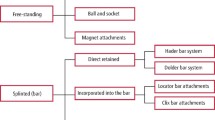Abstract
Data Sources
Medline, Cochrane Library
Study Selection
English articles published from 1966 to June 2007, in which the masticatory performance of subjects with implant-supported or retained dentures was assessed by objective methods and compared to performance with conventional dentures, were included. Single-toth implants studies were excluded.
Data Extraction and Synthesis
Characteristics of subjects, type of dentures, and quantitative results were extracted from original articles. Level of evidence was rated by 2 authors following the United States Agency for Healthcare Research and Quality (AHRQ, www.ahrq.gov/) recommendations
Results
18 articles met the criteria for inclusion. Experimental studies showed:
1. fixed implant-supported partial dentures do not provide significant improvement in masticatory performance compared to conventional removable partial dentures for Kennedy Class I and II partially edentulous mandibles;
2. the combination of a mandibular implant-supported or retained overdenture (IOD) and maxillary conventional complete denture (CD) provides significant improvement in masticatory performance compared to CDs in both the mandible and maxilla for a limited population having persistent functional problems with an existing mandibular CD due to severely resorbed mandible; and
3. the type of implant and attachment system for mandibular IODs has a limited impact.
Well-designed; quasi-experimental studies showed ;
1. mandibular fixed implant-supported complete dentures provide significant improvement in masticatory performance compared to mandibular CDs in subjects dissatisfied with their CDs; and
2. implant-supported mandibular resection dentures have an advantage over conventional dentures in masticatory performance on the defect side of the mouth.
Conclusions
While a number of studies on masticatory performance have been conducted in patients with various designs of implant-supported or retained dentures, high-level evidence supporting advantages in masticatory performance of implant-supported or retained dentures over conventional dentures is limited.
Similar content being viewed by others
Commentary
This systematic review is nicely structured and fulfils the criteria of a systematic review. Two electronic databases were utilized to obtain studies reporting on masticatory performance of subjects receiving implant supported reconstructions. The critical aspect of the search was that the [MeSH] term mastication was used to identify the studies and the search was limited to literature published in the English language. Randomized controlled clinical trials (RCTs), prospective- and retrospective cohort studies were included and the evidence level of the included studies was evaluated.
The main inclusion criteria were that the studies objectively assessed the masticatory performance using standardized masticatory test and statistical comparison was made between implant supported reconstructions and conventional dentures or removable partial dentures.
The weakness of the present systematic review is that it includes and relatively small studies. The 18 included publications report on only 12 patients cohorts. As no meta-analysis could be performed, probably due to the heterogeneity of the material, the results are based on several small and often underpowered studies
For fixed implant-supported complete dentures (FICD) the results indicated, based one prospective study reporting on 27 maxillary FICD and two prospective studies reporting on 26 mandibular FICD, that FICDs give statistically significant masticatory improvement compared with the previously worn conventional complete dentures.
For implant supported overdentures (IOD) the authors of the present systematic review concluded that “the combination of a mandibular implant-supported or retained overdenture (IOD) and maxillary conventional complete denture (CD) provides significant improvement in masticatory performance compared to CDs in both the mandible and maxilla for a limited population having persistent functional problems with an existing mandibular CD due to severely resorbed mandible.” This conclusion is surprising due to the fact that the two studies comparing IOD with previously worn conventional complete dentures and reporting the effect size, reported significant masticatory improvement. Moreover, two RCTs that compared IOD with new complete dentures concluded that IOD enhanced the masticatory improvement compared with conventional complete dentures. Furthermore, this difference reached statistical significance in one of the study at 1 year follow-up.
In conclusion, subjects with low ridge or severe ridge resorption profit from implant-supported overdentures by increased masticatory performance and totally edentulous patients profit from fixed implant-supported complete denture from a masticatory point of view in general.
Finally, it must be kept in mind that masticatory performance based on the ability of the subjects to chew hard food is only a part of oral health related quality of life. Other factors such as, satisfaction with treatment and oral confidence of the subjects also play a major role.
Author information
Authors and Affiliations
Additional information
Address for Correspondence; Dr Kenji Fueki, Removable Partial Denture Prosthodontics, Tokyo Medical and Dental University, 1-5-45 Yushima, Bunkyo-ku,Tokyo, 113-8549, Japan. E-mail: kunfu.rpro@tmd.ac.jp.
Fueki K, Kimoto K, Ogawa T, Garrett NR. Effect of implant-supported or retained dentures on masticatory performance: A systematic review. J Prosthet Dent. 2007 Dec; 98(6):470–7.
Rights and permissions
About this article
Cite this article
Pjetursson, B. Implant supported dentures and masticatory performance. Evid Based Dent 9, 22 (2008). https://doi.org/10.1038/sj.ebd.6400568
Published:
Issue Date:
DOI: https://doi.org/10.1038/sj.ebd.6400568



